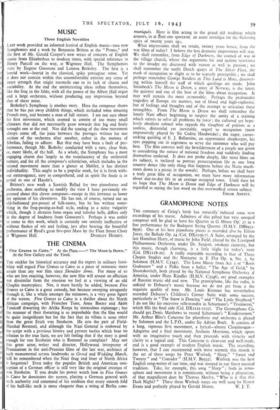MUSIC
Three English Novelties LAST week provided an informal festival of English music—two new Symphonies and a work by Benjamin Britten at the " Proms," and the first of Mr. Gerald Cooper's new series of concerts of English music from Elizabethan to modern times, with special reference to Henry Purcell on the way, at Wigmore Hall. The Symphonies were by Eugene Goossens and Lennox Berkeley. The first is a horrid work—horrid in the classical, spiky porcupine sense. Yet it does not contain within this uncomfortable exterior any sense of inner strength that might reconcile one to its lack of charm and sociability. At the end the uninteresting ideas inflate themselves, like the frog in the fable, with all the power of the Albert Hall organ and a large_ orchestra, without producing any impression beyond that of sheer noise.
Berkeley's Symphony is another story. Here the composer shows that he has put away childish things, which included some amusing French toy5 and become a man of full stature. I am not sure about his first movement, which seemed to consist of too many small climaxes that did not necessarily grow towards that big and finely wrought one at the end. Nor did the scoring of the slow movement always come off, the joins between the passages written for one section of the orchestra after another, rather in the manner of Sibelius, failing to adhere. But that may have been a fault of per- formance, though Mr. Berkeley conducted with a sure, clear beat, or, more likely, of the hall. As a whole, the Symphony has a most engaging charm due largely to the translucency of the orchestral texture, and for all the composer's eclecticism, which includes in the second movement more than a glance at Mahler, it has distinct individuality. This ought to be a popular work, for it is fresh with- out extravagance, easy to comprehend, and in spirit the finale is as genial as one of Haydn's.
Britten's new work a Scottish Ballad for two pianofortes and orchestra, does nothing to modify the view I have previously ex- pressed about this clever composer—except in this instance to lower my opinion of his cleverness. He has not, of course, turned out an old-fashioned pot-pourri of folk-tunes, but he has written some- thing in the frog-posing-as-bull style, ending in a noisy vulgarity which, though it abstains from organ and tubular bells, differs only in the degree of loudness from Goossens's. Perhaps it was unfair to come to this work, which is certainly not entirely ineffective or without flashes of wit and feeling, just after hearing the beautiful performance of Byrd's great five-part Mass by the Fleet Street Choir


























 Previous page
Previous page